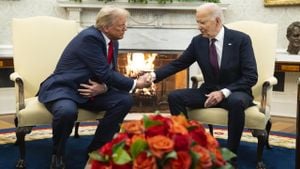On Black Friday 2024, Amazon workers across more than 20 countries are preparing to strike, marking the beginning of what has been dubbed 'Make Amazon Pay' global action days. This annual protest is poised to extend through Cyber Monday, targeting one of the busiest shopping periods of the year and aiming to shed light on various concerns among workers.
The global initiative is spearheaded by UNI Global Union, which advocates for service industry workers, alongside the activist group Progressive International. These organizations have pivotal support, gathering momentum from workers eager to demand fair treatment as they highlight what they perceive as Amazon's anti-worker practices.
From the United States to countries such as Germany, Japan, and Brazil, protests are set to take place. Notable actions include significant strikes from warehouse workers and garment producers, exemplifying the international solidarity of the movement. One of the primary grievances voiced by the workers revolves around inadequate working conditions, which have come under scrutiny especially after oppressive summer heatwaves.
The campaign underlines the issues of labor abuses, environmental exploitation, and what organizers categorize as threats to democratic processes. "Amazon's relentless pursuit of profit comprises the well-being of workers and the environment," states Christy Hoffman, General Secretary of UNI Global Union. She emphasizes the need for fair treatment, reflecting the workers' collective desire for justice, union representation, and environmental responsibility. Hoffman condemned Amazon's extensive spending on union-busting efforts, declaring, “Workers’ desire for justice – for union representation – can’t be stopped."
The message of the protests resonates with many as it underlines the notion of fairness and accountability from Amazon not just to workers but to the environment. The critique of Amazon extends to its tax contributions and its responsibility to counteract significant environmental impacts resulting from its operations.
This year's actions mark the fifth time Amazon workers have mobilized on Black Friday. Hoffman describes ‘Make Amazon Pay’ as developing resistance against Amazon's systemic abuse of power. Varsha Gandikota-Nellutla, Co-General Coordinator of Progressive International, stresses the power of unity across borders, stating, "By uniting our movements across borders, we can not only force Amazon to change but lay the foundations of a world prioritizing human dignity instead of Jeff Bezos' bank balance."
With Amazon properties slated for strikes highlighted on social media and various activist communication channels, workers across the nations plan to articulate their demands for fair wages and improved benefits, illustrating the seriousness of their movement.
Amazon has responded through spokesperson Eileen Hards, who stated, "While we’re always listening and exploring ways to improve, we remain proud of the competitive pay, comprehensive benefits, and engaging, safe work experience we provide to our teams." Despite this reassurance, many workers see this as inadequate, fueling their determination for organized actions.
Activist groups, along with those representing more than 80 unions, environmental organizations, and activists such as Greenpeace and 350.org, join this year's effort, overlaying pressure on the retail giant. Previous efforts have led to significant discussions about labor rights, but the resolution has remained elusive for many activists and workers alike.
Black Friday, instantly recognized as the day after Thanksgiving when holiday shopping typically surges, is transformational for retailers, where numerous companies rely heavily on increased sales for annual profit. Amazon's retention of over 40% of online holiday sales highlights the company’s financial significance within the retail industry, yet juxtaposes sharply against the growing calls for workers' rights and corporate accountability.
The planned protests form part of a continued push for legislative action aimed at protecting workers and holding corporations accountable. This movement looks to galvanize support not only from regular consumers but also from public and private sectors aimed at achieving fairer work environments.
With the increasing scrutiny over Amazon’s treatment of its workforce and environmental impacts, the outcomes of these protests may set new precedents for labor movements globally. Coordinated actions are set to showcase the importance of solidarity across worker communities, amplifying their collective voices during one of the major retail shopping weekends of the year.
While some consumers may anticipate Black Friday for bargain deals, many workers will engage with the day's significance through protests advocating for fair labor practices, emphasizing the need for change within the corporate structures. The attention drawn to these initiatives serves as both inspiration and challenge for existing labor movements across industries as they seek to redefine the relationship between corporations and their employees.



